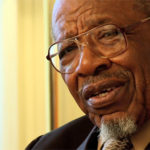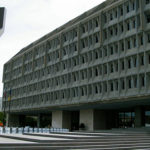The Southern Baptist Convention Ethics & Religious Liberty Commission filed a brief with the U.S. Supreme Court defending prayers offered in Jesus’ name at government meetings.
 Russell MooreThe first legal brief filed since Russell Moore took over as the new chief of Southern Baptists’ moral- and religious-liberty concerns agency weighs in on The Town of Greece v. Galloway, the Supreme Court’s first major case testing the constitutionality of legislative prayers in 30 years.
Russell MooreThe first legal brief filed since Russell Moore took over as the new chief of Southern Baptists’ moral- and religious-liberty concerns agency weighs in on The Town of Greece v. Galloway, the Supreme Court’s first major case testing the constitutionality of legislative prayers in 30 years.
Until 1999, city council meetings in the upstate New York community near Rochester began with a moment of silence. Since then, board meetings have started with spoken prayer led by an invited member of the local clergy.
Objections
Two citizens—one Jewish and the other an atheist—objected that the overwhelmingly Christian content of the prayers violated the First Amendment’s Establishment Clause by favoring a particular faith over all others.
The 2nd Circuit U.S. Court of Appeals ruled in 2012 the town’s process for selecting prayer-givers virtually ensured a Christian viewpoint and “had the effect, even if not the purpose, of establishing religion.”
The ERLC brief argues government officials cannot be asked to police religious speech in a public forum.
“We shouldn’t have a state-sponsored Baptist church, I agree,” Moore said, “but we shouldn’t have a state-sponsored Unitarian church either, and that’s what some are attempting.”
‘Setting standards by which deities may be addressed’
Sign up for our weekly edition and get all our headlines in your inbox on Thursdays
The brief, drafted in part by Michael Whitehead, a Kansas City attorney who represents the Missouri Baptist Convention as general counsel, says the appellate ruling makes judges “the arbiters of this new orthodoxy of ‘neutrality,’ setting standards by which deities may be addressed in public prayers.”
“Of course, such impulses have existed for almost as long as prayers have been given,” it argues. “King Darius, the Mede, was also concerned about civic religion in an ancient incident involving the prayers of government employees and a den of lions.”
“There, too, public prayers were allowed, if directed to the government’s watered-down deity,” the brief continues. “It is a questionable improvement that the 2nd Circuit would punish prayers to the wrong gods by casting officials into a mere den of lawyers.”
The brief also invokes John Leland, a Virginia Baptist minister and important figure in America’s struggle for religious liberty that led to drafting the First Amendment.
“Parsing the words of a prayer is no business for federal judges,” commented Whitehead, co-counsel in a 1981 victory before the U.S. Supreme Court on behalf of equal access for university students at the University of Missouri-Kansas City to use the student union for prayer and Bible study.
Leave the parsing to the parson
“Judges should leave the parsing to the parson,” Whitehead said. “There should be a wall of separation protecting praying citizens from a government-mandated civil religion.”
The 2nd Circuit noted “a substantial majority of the prayers” in the lawsuit record contained uniquely Christian language. Roughly two-thirds included references to “Jesus Christ,” “Jesus,” “Your Son” or the “Holy Spirit.” Almost all such prayers concluded with a statement the prayer had been given in Jesus Christ’s name.
“It is no small thing for a non-Christian—or for a Christian, for that matter—to pray ‘in the name of Jesus Christ,’” the court said. “Prayers delivered in this fashion invoke a deity in whose divinity only those of the Christian faith believe, and do so to the clear exclusion of other faiths.”
Americans United for Separation of Church and State, which filed the lawsuit on behalf of two women plaintiffs in 2008, says by sponsoring persistently sectarian prayers, the town board publicly aligned itself with a single faith.
“In so doing, the board sends the message to non-Christians that they are unwelcome at board meetings and that the board does not represent non-Christian concerns,” the complaint alleged. “Making non-Christians second-class citizens in the body politic runs afoul of the United States Constitution.”
The Supreme Court upheld the Nebraska legislature’s practice of opening with a prayer offered by a state-employed chaplain with its Marsh v. Chambers decision in 1983, finding that legislative prayer was “deeply embedded in the history and tradition of this country.”
‘Fabric of society’
“In light of the unambiguous and unbroken history of more than 200 years, there can be no doubt that the practice of opening legislative sessions with prayer has become part of the fabric of our society,” the high court said in Marsh. “To invoke divine guidance on a public body entrusted with making the laws is not, in these circumstances, an ‘establishment’ of religion or a step toward establishment; it is simply a tolerable acknowledgment of beliefs widely held among the people of this country.”
 Hollyn HollmanHollyn Hollman, general counsel for the Baptist Joint Committee for Religious Liberty, said just because something is constitutional doesn’t make it right.
Hollyn HollmanHollyn Hollman, general counsel for the Baptist Joint Committee for Religious Liberty, said just because something is constitutional doesn’t make it right.
“A moment of silence before a board meeting is preferable,” Hollman said in the June 2013 edition of Report from the Capital. “While the legislative prayer practice was upheld in Marsh, there has been a tendency to stretch that ruling’s boundaries in ways that undermine the expectation of government neutrality toward religion.”
The Supreme Court’s decision to hear the Greece case “provides an opportunity to clarify an aspect of religious liberty law that has become the subject of a great deal of litigation in recent years,” Hollman said.














We seek to connect God’s story and God’s people around the world. To learn more about God’s story, click here.
Send comments and feedback to Eric Black, our editor. For comments to be published, please specify “letter to the editor.” Maximum length for publication is 300 words.